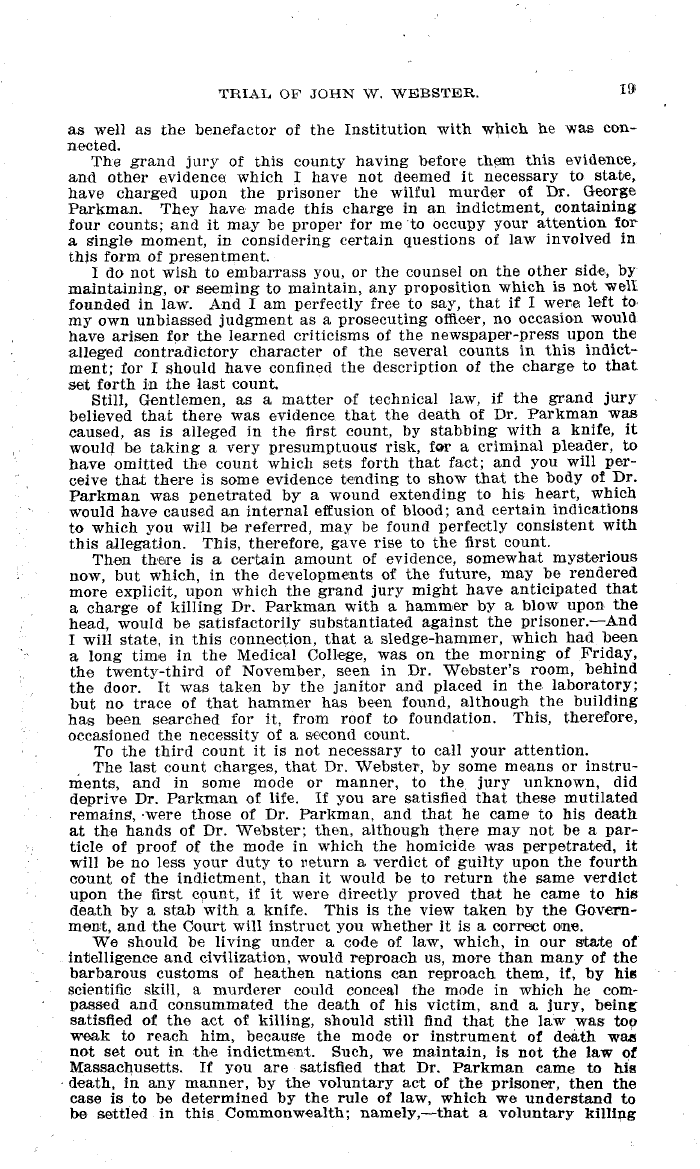|
TRIAL OF JOHN W. WEBSTER.
as well as the benefactor of the Institution with which he was con-
nected.
The grand jury of this county having before then, this evidence,
and other evidence which I have not deemed it necessary to state,
have charged upon the prisoner the wilful murder of Dr. George
Parkman. They have made this charge in an indictment, containing
four counts; and it may be proper for me'to occupy your attention for
a single moment, in considering certain questions of law involved in
this form of presentment.
I do not wish to embarrass you, or the counsel on the other side, by
maintaining, or seeming to maintain, any proposition which is not well
founded in law. And I am perfectly free to say, that if I were left to
my own unbiassed judgment as a prosecuting officer, no occasion would
have arisen for the learned criticisms of the newspaper-press upon the
alleged contradictory character of the several counts in this indict-
ment; for I should have confined the description of the charge to that.
set forth in the last count.
Still, Gentlemen, as a matter of technical law, if the grand jury
believed that there was evidence that the death of Dr. Parkman was
caused, as is alleged in the first count, by stabbing with a knife, it
would be taking a very presumptuous risk, for a criminal pleader, to
have omitted the count which sets forth that fact; and you will per-
ceive that there is some evidence tending to show that the body of Dr.
Parkman was penetrated by a wound extending to his heart, which
would have caused an internal effusion of blood; and certain indications
to which you will be referred, may be found perfectly consistent with
this allegation. This, therefore, gave rise to the first count.
Then there is a certain amount of evidence, somewhat mysterious
now, but which, in the developments of the future, may be rendered
more explicit, upon which the grand jury might have anticipated that
a charge of killing Dr. Parkman with a hammer by a blow upon, the
head, would be satisfactorily substantiated against the prisoner.-And
I will state, in this connection, that a sledge-hammer, which had been
a long time in the Medical College, was on the morning of Friday,
the twenty-third of November, seen in Dr. Webster's room, behind
the door. It was taken by the janitor and placed in the laboratory;
but no trace of that hammer has been found, although the building
has been searched for it, from roof to foundation. This, therefore,
occasioned the necessity of a second count.
To the third count it is not necessary to call your attention.
The last count charges, that Dr. Webster, by some means or instru-
ments, and in some mode or manner, to the, jury unknown, did
deprive Dr. Parkman of life. If you are satisfied that these mutilated
remains, were those of Dr. Parkman, and that he came to his death
at the hands of Dr. Webster; then, although there may not be a par-
ticle of proof of the mode in which the homicide was perpetrated, it
will be no less your duty to return a verdict of guilty upon the fourth
count of the indictment, than it would be to return the same verdict
upon the first count, if it were directly proved that he came to his
death by a stab with a knife. This is the view taken by the Govern-
ment, and the Court will instruct you whether it is a correct one.
We should be living under a code of law, which, in our state of
intelligence and civilization, would reproach us, more than many of the
barbarous customs of heathen nations can reproach them, if, by his
scientific skill, a murderer could conceal the mode in which he com-
passed and consummated the death of his victim, and a jury, being
satisfied of the act of killing, should still find that the law was too
weak to reach him, because the mode or instrument of death was
not set out in the indictment. Such, we maintain, is not the law of
Massachusetts. If you are satisfied that Dr. Parkman came to his
death, in any manner, by the voluntary act of the prisoner, then the
case is to be determined by the rule of law, which we understand to
be settled in this Commonwealth; namely,-that a voluntary killing
|

